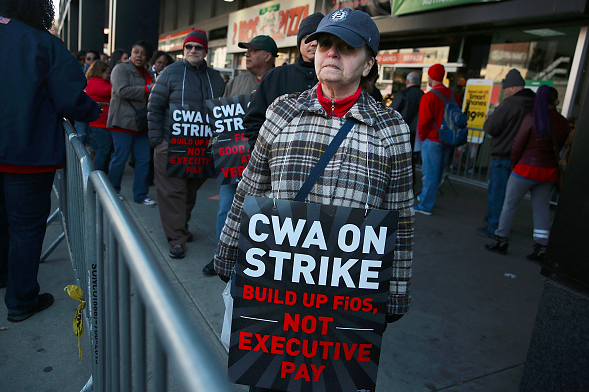Photo of the Month: May 2016

In the first half of 2016, discontented union workers around the western world began protesting against unfavorable contract terms. From an almost two month long strike by Verizon employees, to the nationwide strikes against labor reforms in France, to rallies by Macy’s employees calling for better wages workers are pushing back against what they see as a reversal of protections they previously enjoyed.
In late May, almost 40,000 Verizon employees on the East Coast ended a 6-week-long strike protesting the outsourcing of Verizon call center jobs. They also took issue with a lack of reinvestment in the company’s infrastructure expansion. The employees were striking to protect middle-class jobs and keep them in the community to provide better living standards for their families. Christine Owens of the National Employment Law Project looks at the largest strike in recent history in the Huffington Post:
Verizon is incredibly profitable, averaging $1.5 billion in net revenues per month. Yet, while Verizon raked in huge profits, it refused to invest in either its workforce or in maintaining and expanding service for consumers. Instead, the company offshored thousands of U.S. jobs to call centers in the Philippines and Mexico, paying those workers as little as $2.13 an hour. It’s no wonder that the company’s profile sank to a three-year low, and analysts estimated that the strike cost the corporation 150,000 new customers.
Simultaneously, hundreds of Macy’s employees rallied outside the store in New York City to call for affordable healthcare, higher wages and easier working schedules. At this point, Macy’s is reportedly looking to take away pensions, cut commissions and exclude affordable healthcare from their employment packages. Macy’s employees have therefore authorized their union to call a strike if their demands go unmet by mid-June.
Across the Atlantic, things in France continue to get worse as industries, including gas stations, transportation workers and air traffic controllers among several others, go on strike to protest against the labor reform bill. As the government inches closer to passing this bill, which makes it easier to fire employees and have longer work hours each week, the French people are taking to the streets to show opposition. The government argues that strong union protections make it difficult for companies to fire workers and take risk, thereby keeping the economy from growing.
Earlier this year, a Center for American Progress report looked at how unions benefit the middle class:
Unions represent workers in the middle of the income distribution, which raises the earnings of workers who would otherwise fall below the middle-class threshold. We call the higher share of union workers among middle-class workers the union equality effect… Our main findings are that the decline in union coverage accounts for 35 percent of the falling share of middle-class workers and that the combination of the shrinking share of union workers and the reduction in the union equality effect explains almost half of the decline in middle-class workers.
Click here for more monthly photos on people and issues we care about.
Comments are closed here.